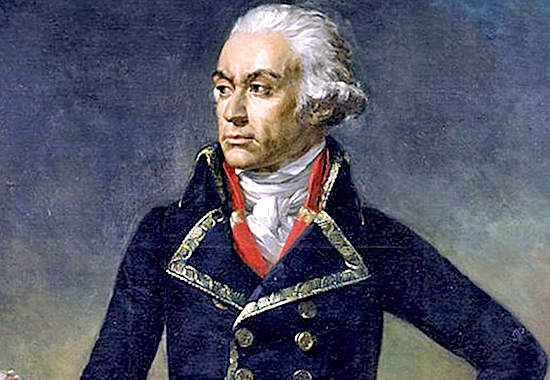|

Charles-François du Périer Dumouriez
1739-1823
|
|
Image Above
Charles-François
Dumouriez
Detail of the
painting by Jean Sébastien Rouillard |
Dumouriez, sometimes also spelled Dumourier, was a French general.
He was born at Cambrai, France,
and died at Turvilla Park, Buckinghamshire, England.
In 1758, he became an officer
and saw action in the
 Seven Years' War.
Seven Years' War.
In 1790, he became a member of the
 Jacobin Club.
Jacobin Club.
In March 1792,
Dumouriez was made minister for foreign affairs during the
Girondin government.
See also
 What's a Girondin?
What's a Girondin?
On August 18, 1792, the commander of the
Armée du Nord,
 Lafayette, was declared
a traitor, and Dumouriez was given the command.
Lafayette, was declared
a traitor, and Dumouriez was given the command.
On September 20, 1792, Dumouriez
defeated the Prussians in the
 Battle of Valmy.
Battle of Valmy.
On November 3, 1792, Dumouriez
invaded the Austrian Netherlands.
On November 6, 1792, Dumouriez
defeated the Austrians in the
 Battle of Jemappes.
Battle of Jemappes.
From March 12, 1793, Dumouriez
was in open rebellion against the Convention.
On March 18, 1793, Dumouriez
lost the
 Battle of Neerwinden.
Battle of Neerwinden.
On March 21, 1793, Dumouriez
lost the
Battle of Louvain, also
called the Battle of Leuven.
On March 22, 1793, Dumouriez
started negotiations with Austrian commander
 Karl Mack von Leiberich. Karl Mack von Leiberich.
On April 2, 1793, the French
Minister of War and three commissioners from the Convention
arrived at Tournai to arrest Dumouriez. Dumouriez didn't
fancy the
 guillotine and, instead, arrested the arresting officers. He then sent the entire posse guillotine and, instead, arrested the arresting officers. He then sent the entire posse
 Clement Metternich's
direction for interrogation.
Clement Metternich's
direction for interrogation.
On April 5, 1793, Dumouriez officially defected to the
Austrians. He was escorted first from Brussels to
Regensburg, then to Vienna, and later to England.
Dumouriez lived in exile for the
rest of his life and was buried at Henley-on-Thames.
Here is more about the
 French Revolution.
French Revolution.
And here is more about the
 French Revolutionary Wars.
French Revolutionary Wars.
Dumouriez Quoted
Les courtisans
qui l’entourent n’ont rien oubliè et n’ont rien appris.
The courtiers
who surround him have forgotten nothing
and learnt nothing.
Charles François du Pèrier Dumouriez of
 Louis XVIII,
at the time of the Declaration of Verona, September 1795. These words were later used by
Louis XVIII,
at the time of the Declaration of Verona, September 1795. These words were later used by
 Napoleon in his
Declaration to the French on his return from Elba. Napoleon in his
Declaration to the French on his return from Elba.
More History
|